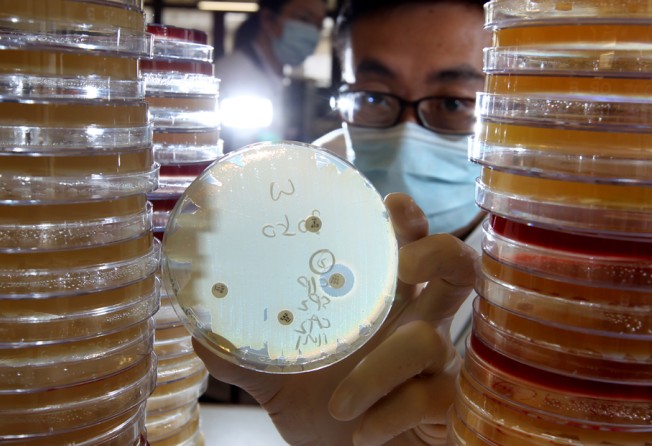Superbug cases on the rise at Hong Kong's public hospitals
One drug-resistant bug was found nine times as often last year as the year before, figures from the city's Hospital Authority reveals

Drug-resistant "superbugs" are being found more often in public hospitals, Hospital Authority data shows, with one bug showing up nine times as often last year as it did the year before.
Some 2,194 patients were found to be carrying vancomycin-resistant enterococcus (VRE) last year, up from 246 in 2012. Cases of another type of superbug, multidrug-resistant acinetobacter (MDRA), almost doubled from 456 to 842.
While both bugs are treatable, they can, if undetected, cause complications in the treatment of other conditions. Superbugs were branded a "global emergency" by the World Health Organisation in April.
In about 90 per cent of VRE cases, the patient was carrying the bug but was not showing symptoms, said Dr Tsang Ngai-chong, chief infection control officer for the authority. He said the increase was largely down to two screening exercises in the fourth quarter of last year, in which every patient was tested for VRE.
Tsang said VRE was common in the community and could also be found in animals.
He said MDRA could survive for long periods even in a harsh, dry environment. It was especially hazardous for patients with weak immune systems.
"The number of drug-resistant bug cases has been steadily growing," Tsang said. "With more and more people admitted to hospital, we need to conduct better disinfection in our daily life."
Scientists believe the overuse of antibiotics has contributed to the rise of the superbug. Antibiotics would kill other nonresistant bacteria that might otherwise keep the superbugs in check, and the superbug could also spread the drug resistance to other bacteria, leading to additional problems.
While some superbugs can be treated by one or two types of antibiotic, others are untreatable.
Someone who carries such a bug would see their chances of suffering symptoms increase the longer they remained in hospital, Tsang said, as they would be given more antibiotics.
He said hospitals should screen patients who had been in hospitals outside Hong Kong within the previous six months, who were most likely to carry drug-resistant bacteria. Carriers should be isolated.
But he said "extremely high" occupancy levels in wards, a heavy workload for staff, the difficulty of getting people to keep their hands clean and contamination in buildings were all getting in the way of efforts to tackle the bugs.
Cases of two other superbugs, methicillin-resistant staphylococcus aureus and carbapenem-resistant enterobacteriaceae had meanwhile remained stable, the data showed.